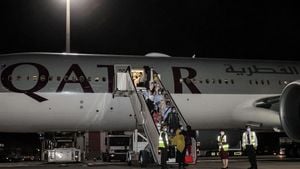Across the U.S.-Mexico border, immigrant families are increasingly facing dire circumstances as they attempt to seek asylum. A poignant example is the story of Dorian and Magdy Mendoza, two brothers from Honduras who braved the perilous trek through Mexico, battling significant obstacles along the way.
Their ordeal exemplifies the dangers and determination many migrants endure. The brothers traveled northward on top of the infamous freight train known as “La Bestia,” which has become synonymous with risk for countless migrants. Tragically, during this treacherous experience, Dorian fell from the train and was presumed dead. Magdy, faced with the choice to continue on or turn back, chose to press on and make his way to the United States, eventually arriving in Houston.
Despite the U.S.’s stringent immigration policies under the Trump administration, which have implemented the 'Remain in Mexico' policy, migrants like the Mendoza brothers persist. Their plight is emblematic of the broader struggles faced by those seeking refuge and opportunity.
Upon realizing Dorian was alive, Keleth Mendoza, the brothers’ sibling who had opted to remain behind, set out to find his brother on the same train tracks. Against all odds, he located Dorian, who had suffered severe injuries including the amputation of his foot. Together they sought safety, eventually reuniting with Magdy.
The Rivera family’s narrative highlights the relentless spirit of immigrants, but it doesn’t end there. Organizations like Isaiah 55 Ministries, led by Mario Xoca and Meg Flores, are stepping up to fill the gaps left by the immigration system. Their work is evident at the Mexico border, where many migrants are left stranded, unable to cross the Rio Grande due to legal restrictions.
Minister Xoca, who has deep roots on both sides of the border, recognized the acute needs of these communities and the call to action for local churches. His insights reveal how the region's ministries became pivotal resources. “You can’t be on the border and not be involved in immigration,” he noted, underscoring the urgency of their mission.
Flores, involved deeply with the program, utilizes her role to provide structure and hope through education. She manages classes for children aged five to eleven, focusing on Bible study, arts, and science. Flores described her classroom as "a joyful chaos," filled with energy and noise—truthfully reflecting the mixed realities of the children who arrive dazed and uncertain of their futures.
Open-air classes, set against the hustle of Reynosa, serve not just to educate but to build community. Children line up eagerly for snacks after class, their laughter ringing out as they rush to play, often the only respite they find during their uncertain wait for asylum.
Isaiah 55 Ministries has transformed abandoned spaces along the Rio Bravo (the Mexican name for the Rio Grande) to create community centers where everyone is welcome. These spaces are adorned with vibrant artwork made by the children, symbolizing both resilience and hope. For many of these kids, there’s no guarantee of entering formal schooling; these classes are their lifeline.
Yet, external challenges loom large. The militarization of the border has been ramping up, with thousands of U.S. soldiers placed to erect wire barriers, making “Remain in Mexico” policies seem permanent. Desperation grows as cartels threaten the vulnerable, and tensions heighten. Nonetheless, the local communities cling to the wisdom shared among them: “Al mal tiempo, buena cara,” urging them to maintain courage and composure during tough times.
Despite the harsh realities of current immigration policies, organizations like Isaiah 55 Ministries provide not only services but also dignity and solidarity to migrants. They cultivate hope where it seems lost, fostering unity through education and compassion.
This humanitarian drive is emotive and significant, highlighting how, even amid uncertainty, support networks can emerge, embodying the spirit of resilience and humanity. Whether through acts of kindness or organized aid, individuals and groups keep the faith alive, reinforcing the belief in brighter days even amid challenging circumstances.



